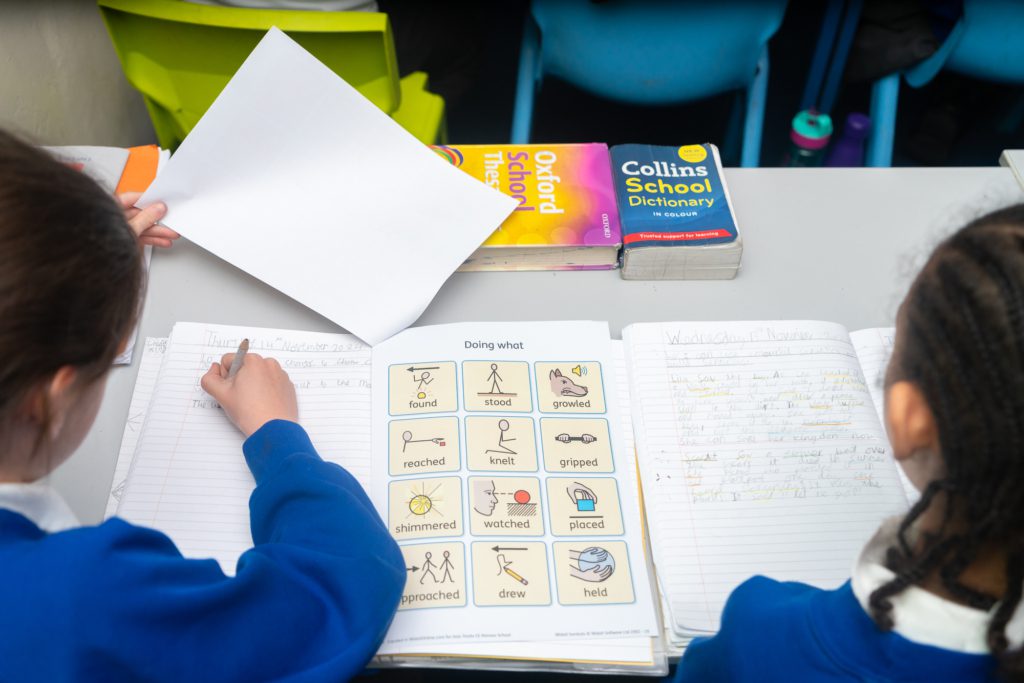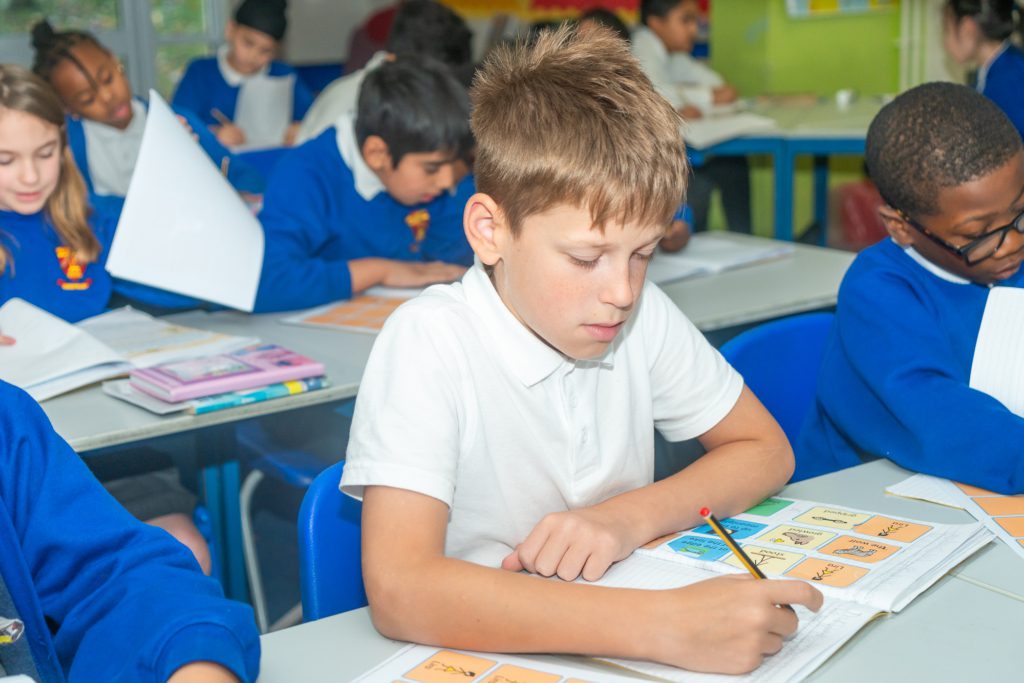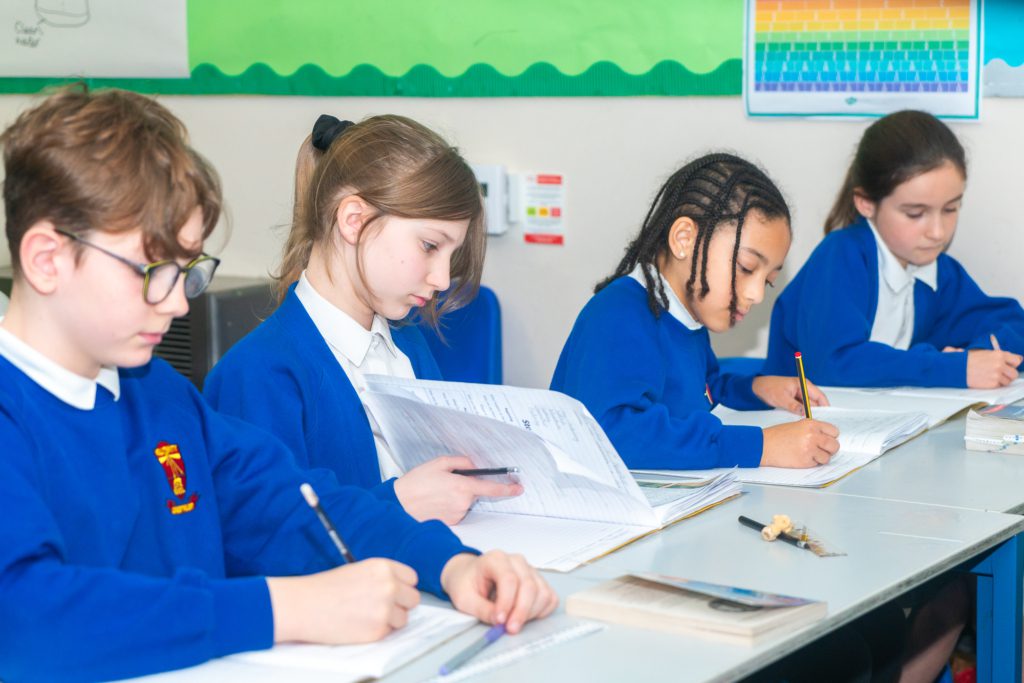English Writing Subject Leader: Mr A Crawford
English gives pupils the building blocks for successful communication and a life-long love of learning.
From those first tentative sentences to communicate what we want to play with, all the way up to a balanced debate, being able to speak clearly and get our point across is a vital life skill that we develop with our pupils daily. Once a child can say it, then (along with their handwriting skills) they can write it.
From making marks on a page to writing a complete text, with paragraphs and a wide variety of punctuation and vocabulary, we experience writing every day, across a range of curriculum subjects. Our development of spoken communication gives pupils the tools to transfer their ideas into writing: from stories to poems to instructions to letters, and many more.
For any more information on Holy Trinity’s English Reading Curriculum, please contact the office.
Intent
Our English writing curriculum is designed to develop confident, independent, and successful speakers and writers. Our pupils receive a stimulating and enriching experience in English, developing the skills necessary to master the National Curriculum English Programme of Study.
We develop oracy skills in every year group, ensuring pupils are exposed to a rich vocabulary wherever possible. Our pupils are confident speakers, who respond in full sentences and who are actively encouraged to express and justify their opinions through discussion and debate. We also know that listening is a vital communication skill and pupils are taught how to listen attentively and give feedback, or ask thought-provoking questions based on what they have heard.
Our writing curriculum is designed to turn confident and articulate speakers into writers who are able to express their thoughts, ideas and analyses in texts across a range of genres. Writing is taught using a wide range of high-quality texts. Our choice reflects the diverse cultures, religions, and social backgrounds from which our pupils originate as this gives them an insight into history and background; providing a mirror to identity and allowing for connections to be built.
Our aim is for children to leave school being able to speak confidently in front of others and to use this oral rehearsal to write with confidence and accuracy for a variety of purposes and audiences whilst developing their own individual flair.
Our curriculum is relevant, engaging and memorable. It will create lifelong learners.


Implementation
We teach using the principles of Barack Rosenshine and Kagan’s Co-operative Learning and Active Engagement within all lessons and across the whole school. (See Teaching and Learning.)
The incorporation of these principles makes English teaching and learning successful. Rosenshine’s Principles of Instruction pave a structured pathway through writing as it allows the learner to understand their starting point, the journey they are going on with writing and to produce outstanding work as their final piece.
Writing
Pupils develop an understanding of texts using their reading skills and learn to engage with texts in a variety of ways thanks to the careful high-quality modelling of teachers in class. Pupils learn about the purpose of writing in different styles and genres and study various model texts in order to then be able to write with their own voice.
Impact
Through the above approaches we aim to see:
- Children can develop into confident, articulate speakers who are able to articulate and express themselves and their ideas clearly.
- Children, who are imaginative, creative, independent, inquisitive, inquiring and confident writers.
- Children with a positive and enthusiastic attitude toward writing will nurture a life-long love of writing.
We endeavour to ensure that children are able to produce written work in all areas of the curriculum to a similar standard as in their English lessons and can write in a range of genres for a variety of purposes needed in day-to-day life.

English Writing in Each Stage
Children learn to mark make and write through both child-initiated learning opportunities and formally through our Little Wandle Revised Letters and Sounds phonics scheme. They will learn to form letters, including capital letter formation. By the end of EYFS, children working at the expected level will be able to write recognisable letters, most of which are correctly formed; spell words by identifying sounds in them and representing the sounds with a letter or letters; and write simple phrases and sentences that can be read by others.
Click the link here to find out more about our Early Reading/Phonics curriculum
Pupils will use the CLPE Power of Reading sequences of learning and access high quality texts.
Throughout Year 1, pupils will be encouraged to talk about their writing. They will create lists, write down keywords and illustrate their ideas before writing. Drama and role-play activities will be used to help the children to explore their ideas and to familiarise them with traditional tales and stories. Pupils will write in sentences, linking ideas together using ‘and’ and full stops will be used. They will learn to connect and order their ideas using ‘first’, ‘then’, ‘next’ and ‘finally’. Pupils will have the opportunity to write instructions, recounts and informational texts. Writing frames will enable them to write simple adverts and posters. They will use adjectives to describe the colour and size of things and they will also begin to explore nouns and verbs.
During Year 2, pupils will start to sequence their ideas more confidently in both fiction and nonfiction writing. They will use time connectives, headings and numbers. They will start to create and use simple checklists for their writing and recognise the main features of different genres. Pupils will continue to participate in drama and role-play activities to inspire their writing about real and fictional events. The children will be provided with opportunities to write recounts, instructions, information texts, stories and poems and they will demonstrate an understanding of writing in chronological order. Capital letters, full stops, question marks and exclamation marks will be used more consistently to punctuate their writing and they will begin to use commas to separate items in a list. A wider range of adjectives, adverbs and nouns will be used in all written work. All pupils will be encouraged to re-read their work to check for errors and to identify where improvements can be made.
Click the links below to find out more information about KS1:
Pupils will use the CLPE Power of Reading sequences of learning and access high quality texts.
They will use planning structures (such as mind maps) to note down their ideas and key vocabulary before writing. Simple and compound sentences will be used accurately with the correct punctuation. Inverted commas will be used accurately. Pupils will use more adventurous vocabulary such as a wider range of adjectives and adverbs. Pupils will also be provided with regular opportunities to critically evaluate their own and others’ writing.
Simple and complex sentences will be used effectively and will be correct punctuations, including brackets, dashes and commas to mark clauses. Pupils’ ideas will be linked across paragraphs and all work will have a clear structure. Pupils will select specific vocabulary for effect and a varied range of language will be used confidently. Pupils will generate detailed plans before writing, working both independently and collaboratively. Pupils will have the opportunity to write a range of genres with a variety of stimuli such as visual texts and drama pieces. In fiction pieces, ambitious vocabulary will be used to create atmosphere and dialogue to develop characters and action. Pupils will ensure all written work is correctly punctuated along with accurate tenses and spelling. Pupils will edit and improve their work, focusing particularly on style and structure.
Click the links below to find out more information about KS2:
English Writing Progression
SEND Information
Interventions, support and challenges are constantly revised and adapted to ensure all children are supported in achieving learning. The above areas are robustly and continuously monitored to ensure any gaps in learning are addressed.
Home Learning
To help pupils catch up, we also use these strategies for extra support: If pupils fall behind, we have a range of strategies we use to help them catch up with their peers. This includes extra activities or consolidation and practice for targeted groups. One-to-one support with a trained teaching assistant. In-class small group support. Extra adult-led verbal support to improve spoken language. Role-play to practise language and sentence construction. Children are reassessed regularly so that they can keep up with their age-related learning.
English Writing Extra Resources
Further English Writing Help
Fun English Writing Games

